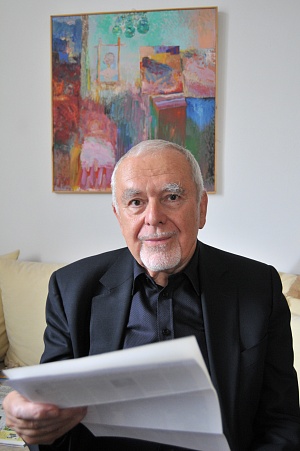
JAN KLUSÁK’S MUSICAL RIPENING
GENERIC INTERVIEW


The Czech composer Jan Klusák is celebrating his 80th birthday. He has a lot to look back on. During his career, he has created numerous works for various configurations, ranging from chamber pieces to grand symphonic opuses and operas, as well as acclaimed film scores. And he has also appeared in several unforgettable theatre and film roles.
To mark the maestro’s birthday, Supraphon is releasing a double album titled Inventions (SU 4163–2), featuring 10 Inventions and a special bonus, the symphonic poem Perished Happiness, thus showing the path Jan Klusák has pursued, how he has approached music and where he has arrived.
You once proclaimed that you wanted to become a modern-time Mozart. Have you succeeded?
When I was a child I wanted to compose in a similar manner. My mum said that it wasn’t possible, that today music is written differently. But then I discovered Iša Krejčí, a modern composer yet one who wrote like Mozart. I found out that “Neo-Classicism” existed. In my adolescence I got to Neo-Classicism and composed in this manner when I was a student. Later on, thank heaven, I grew out of it.
Can the new double album be deemed a sort of recapitulation of your musical development?
Yes, in that the oldest piece on the album dates from 1961, the most recent from the year before last. Accordingly, the CDs show the half-century development of myself, as well as of the musical form in which I have been composing. The first five Inventions reveal that at the time of their writing I didn’t have an absolutely clear idea of what this form should be like, only by the sixth did I realise what I wanted to do with it. I must say that I have changed considerably over the 50 years, and the music bears witness to that.
Two of the compositions on the album were created over a relatively long time span; is that usually the case with you?
No, it isn’t, it hasn’t happened to me many times. But it really did take me 20 years to complete Invention No. 9. As for the symphonic poem Perished Happiness, I was working on it for about six years. And when it comes to the opera Philoctetes, which I am putting the finishing touches to now, I began composing it back in 1982. Only 30 years down the line have I got around to writing it properly. And that’s good, since at the time I wouldn’t have been able to do so.
On your new album, Perished Happiness is a bonus.
This piece, and that which in general I call the symphonic poem, is the antipode of the invention form. The invention is a rigid form, like the fugue, for instance. On the other hand, the symphonic poem is an improvised, free form. Relaxation, breaking away from rigid work.
When watching the documentary Jan Klusák – Axis Temporum, directed by Dan Krameš, one gets the impression that you have calculated your pieces by means of various graphs and schemes rather than by composing. But that certainly isn’t the case…
No, it isn’t. Calculation in music has long existed, and many composers seem to have calculated their music. But it always only serves as a skeleton that must be fleshed out. Similarly to bones being enwrapped by muscles. Take Bach, for instance: it also appears that he calculated his music, but he always created music.
Could you describe your method of composing?
When I began acquainting myself with atonality, that is, with music that does not contain keys, I came to realise that the sonata form cannot be applied in it, since the sonata form is based on tonal contrast. And when there are no keys in music, there is nothing to put into contrast. So I strove to find a form that would fit this method of work. I draw upon the twelve-tone row and tailor the shape of compositions to its form.
A special chapter in your career is your collaboration with the conductor Libor Pešek. From the late 1950s, you performed together at the Na zábradlí theatre.
We were really lucky to have found, after graduating, such a forum for presentation. Libor wanted to have a chamber orchestra, yet ultimately it was a wind ensemble, since wind instrument players were the most willing to endure the gruelling rehearsals. Libor was a pedant and nit-picker, and precious few could cope with it. But the result was superb. Compositions were explored down to the finest detail, to the tiniest phrase. And for me, Libor and the Prague Chamber Harmony were like a workshop where I could devise various things, write – and hear it immediately. And splendidly played, to boot.
Did your compositions have to be rehearsed a lot – were they difficult?
Oh, very much so! That which I wrote for the trumpets or trombones… I wrote it as though for the clarinets, really difficult passages, and they played everything! I wouldn’t dare to write it in that way today.
The mentioned concerts took place on Sunday mornings. Did people attend them?
Yes, they did. Well – eventually. Initially the auditorium was, let’s say, half-empty. Or half-full – depending on your viewpoint. But then the word started to spread among professionals that they were high-quality performances, and so we allured figures of such renown as Jaroslav Šeda, Miloš Šafránek and Ilja Hurník, who began taking interest in us…
Let us return to the album Inventions. How difficult was it to put the repertoire together?
It wasn’t really that difficult. When there is a set of Inventions, there is nothing to choose from – it’s a given. The idea of releasing them all at once came from Mr. Matouš Vlčinský from Supraphon and my associate Dr. Petr Vít.